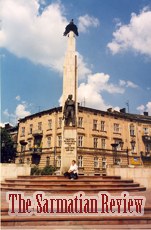Our editorial team is particularly happy with this issue because of the range of topics it covers and the importance of some of these topics, particularly given their underrepresentation in commonly read Slavic journals. First, the issue of artistic consequences of the political systems that enslave their citizens is addressed, as broached by Professor Svetlana Vassileva-Karagyozova. Colonialism not only drains the country of financial capital and international prestige, it also deforms the literary genre that has shaped many generations of Germans, English, or French: the bildungsroman. Instead of demonstrating a healthy development of personality, the bildungsroman in Soviet-occupied countries paints caricatures of such development. The influence of political systems on literary genres is a fertile field for researchers, and we salute Professor Vassileva-Karagyozova for a breakthrough in this area.
The range of books reviewed in this issue is exceptionally broad. The first two reviews deal with perhaps the finest short-story teller in America, Anthony Bukoski; the third review speaks about Polish communities in Texas in the nineteenth century. A balanced survey of the monumental work on Rising ’44 follows-no, it is not Norman Davies’s book, but a huge volume of documents published jointly by Polish and Russian researchers. Next, a review of a book by the notorious Patrick Buchanan whose ignorance-laced prejudice against Polish Catholics is matched only by his accommodating attitudes toward Russian postcommunists. In his largely negative portrait of Winston Churchill Buchanan leaves out Churchill’s deplorable duplicity toward the Poles. Indeed, as the reviewer says, Churchill played a major role in handing over nearly half of Europe to the Soviets. Lewis Siegelbaum’s book reminds us of the provenance of present-day postcommunists, while the reviewer of his book aptly notes that the book erroneously implies that the USSR was inhabited exclusively by Russians. Finally, an exceptionally fine review of the poetry of Kapuściński (yes, Ryszard Kapuściński) and Julia Hartwig. On the final pages of the issue we present translated poetry by two very different poets, Adam Mickiewicz and Jerzy Harasymowicz. What separates them is a century and a half under foreign occupation: back to our lead article.
Back to the January 2009 Issue
The Sarmatian Review
sarmatia@rice.edu
Last updated 2/21/09 |
